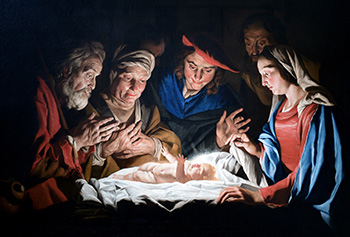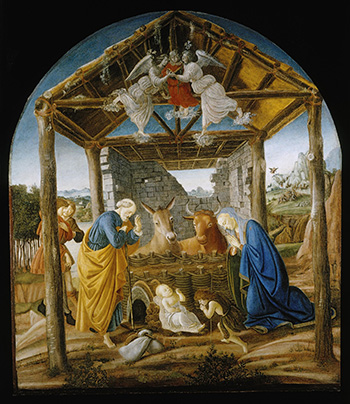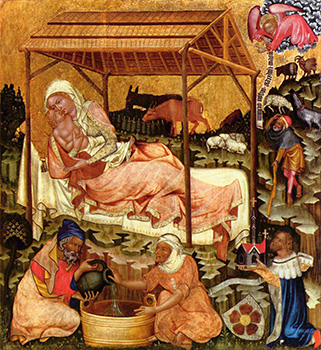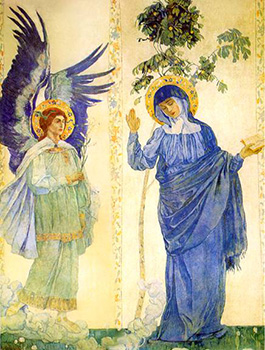From Our Archives
Debie Thomas, When You See These Things (2018); Ron Hansen (novelist), Preparing for the Son of Man (2021).
This Week's Essay
Psalm 25:5, "For Thee I wait all the day."
For Sunday December 1, 2024
Lectionary Readings (Revised Common Lectionary, Year C)
Psalm 25:1–10
1 Thessalonians 3:9–13
Luke 21:25–36
Last week I was shopping for dinner when I suddenly realized that the background music at the grocery store was the perfect song for Advent — "The Waiting" by Tom Petty. The refrain of the song goes, "The waiting is the hardest part / Every day you see one more card / You take it on faith, you take it to the heart / The waiting is the hardest part."
I think it's easy to explain why the song was a hit when it was released in 1981, and why it still resonates with listeners forty years later. In simple lyrics, Petty describes a common and powerful experience. We all know how hard it can be to wait — for a lab result from the doctor, a call back from a job interview, or kids waiting for Christmas. This Sunday December 1 is World AIDS Day, when we remember the 42 million people who died while waiting for a cure for HIV.
Petty says the title for the song came to him from fellow rock star Janis Joplin, who once told him how much she loved touring and being on stage, and how "everything else is just waiting." In other words, everything else is in second place compared to your greatest joy.
 |
|
Adoration of the Shepherds by Matthias Stormer, 1632.
|
Waiting for that greatest joy can feel like forever. The waiting demands patience and discipline. Advent is four weeks of waiting for the fulfillment of the Lord's Prayer: "Thy kingdom come, Thy will be done, on earth as it is in heaven." Not later, but right now. Not in heaven, but here on earth. And so we pray with the psalmist this week, "For Thee I wait all the day." (Psalm 25).
During Advent we look both backwards and forward in time. We look backwards to celebrate the birth of Jesus, when "God was in Christ, reconciling the cosmos to himself" (2 Corinthians 5:19). And we look forward to his "second coming," when God will culminate what He has inaugurated, finish what He has started, and fulfill what He has promised. Right now, today, we live in-between these two comings, in the interim (see the Weekly Prayer below), in what a fried of mine calls "the messy middle."
Celebrating Christmas and the first adventus of Jesus in the incarnation at Bethlehem seems easy enough; but how should we speak about the second coming and the future fulfillment of all history? Three of the four lectionary readings this week speak of a future restoration or consummation of human history.
The second coming of Jesus was such a central affirmation of the early believers (cf. the Apostles Creed) that pagan critics scoffed at the idea: "You know that mockers will come with their mocking, saying, 'Where is the promise of his coming?' For ever since the fathers fell asleep. everything continues just as it was from the beginning of creation." (2 Peter 3). Contemporary derision about the second coming is nothing new.
 |
|
Nativity of Jesus by Botticelli, 1473–1475.
|
I've come to think about the End of History in four ways — personal, civilizational, global and cosmic. If you are born a woman in Japan today, you can expect to live 84.7 years. Then comes the end. Environmental experts speak of civilizational death. Advanced civilizations like Easter Island and Machu Picchu have vanished. Some of the thirty-three tiny islands of the nation of Kiribati are already completely submerged under rising sea levels. In the next 25 years, 40-50 island nations will totally disappear.
The end of the earth is certain, it will just take a long time. "It is as sure as can be," writes the physicist and Anglican priest John Polkinghorne, "that humanity, and all forms of carbon-based life, will prove a transient episode in the history of the cosmos." The end of the earth is small beer compared to the end of the entire universe, which is just as bleak but equally certain.
But then what? What comes after The Final End? No one knows, or even can know. Any position that you take is an act of faith, whether you are an atheist scientist or a Christian who believes the gospel this week where Jesus describes a day when "redemption draws near" for "the whole earth" (Luke 21:28, 35).
 |
|
Medieval miniature of the Nativity, c. 1350.
|
We need not know the details of the "last days" or "second coming" described by Jeremiah, Jesus or Paul. I like CS Lewis's analogy of actors in a very real drama. We don't know everything about the play, whether we're in the first or last act, or even which characters play the minor and major roles. In our ignorance, we really have no idea when the End of the play ought to come. But the plot will find fulfillment, even if our limited understanding right now obscures it. Perhaps the Author will fill us in after it is over, but for now, "playing it well is what matters infinitely."
In Luke's Gospel this week Jesus exhorts his followers to "play it well." He warns us that just as we know that summer is near when certain flowers bloom, we should not let the anxieties of life weigh us down so that the end "closes on you unexpected like a trap." Rather, he tells us to live carefully, to watch, and to pray that we "may be able to stand before the Son of Man" (Luke 21:34–36).
So, we must wait, and that can be the hardest part. But it's also true that the waiting won't last forever. The day is coming. We can choose to believe the psalmist for this week: "Lord, no one who waits for Thee will be ashamed." (Psalm 25).
 |
|
Annunciation by Mikhail Nesterov, c. 1911, Russia.
|
Weekly Prayer
John O'Donohue
When near the end of day, life has drained
Out of light, and it is too soon
For the mind of night to have darkened things,No place looks like itself, loss of outline
Makes everything look strangely in-between,
Unsure of what has been, or what might come.In this wan light, even trees seem groundless.
In a while it will be night, but nothing
Here seems to believe the relief of darkness.You are in this time of the interim
Where everything seems withheld.The path you took to get here has washed out;
The way forward is still concealed from you."The old is not old enough to have died away;
The new is still too young to be born."You cannot lay claim to anything;
In this place of dusk,
Your eyes are blurred;
And there is no mirror.Everyone else has lost sight of your heart
And you can see nowhere to put your trust;
You know you have to make your own way through.As far as you can, hold your confidence.
Do not allow confusion to squander
This call which is loosening
Your roots in false ground,
That you might come free
From all you have outgrown.What is being transfigured here is your mind,
And it is difficult and slow to become new.
The more faithfully you can endure here,
The more refined your heart will become
For your arrival in the new dawn.John O'Donohue (1956-2008) was an Irish poet, author, priest, and philosopher, best known for popularizing Celtic spirituality.
Dan Clendenin: dan@journeywithjesus.net
Image credits: (1) Wikipedia.org; (2) Wikipedia.org; (3) Wikipedia.org; and (4) Wikipedia.org.





